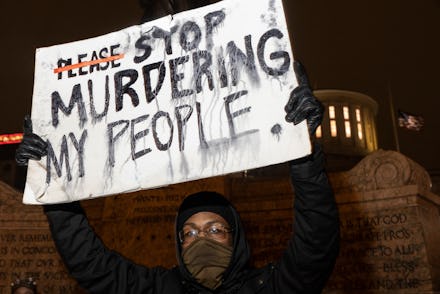Ohio police have "run amok" in their dealings with protesters, a federal judge admitted

Last summer, as protests spread across the United States following the police murder of George Floyd, officers did not hesitate to respond with tear gas, rubber pullets, pepper spray, and more. The law enforcement response led to several protesters being seriously injured. Now, a federal judge has prohibited at least one police department from using force against nonviolent protesters.
Instances of police brutality in Columbus, Ohio, were well-documented throughout the series of protests. The Columbus Navigator, a local news site, compiled a number of instances of police violence against protesters, including the macing of Ohio Rep. Joyce Beatty at a downtown Columbus protest last May. In July, over two dozen people filed a federal lawsuit after being injured by police at protests.
A multi-day hearing was held before Chief Judge Algenon L. Marbley of the Southern District of Ohio in February. Last week, Marbley issued a preliminary injunction against the city of Columbus and its police. In his 88-page opinion, Marbley referred to the actions of Columbus police as "the sad tales of officers, clothed with the awesome power of the state, run amok."
"Unfortunately, some of the members of the Columbus Police Department had no regard for the rights secured by this bedrock principle of American democracy," Marbley wrote. In the lawsuit, protesters also stated that police often utilized force at random. Marbley took note of that, writing, "What is more, [officers] sometimes failed to give audible warnings or adequate time to disperse before resorting to less-lethal force."
The injunction bans police from using "non-lethal" force like body slams, flash grenades, chemical irritants, batons, shoving, and more. In addition, Marbley ruled that press, paramedics, and legal observers must be allowed to record protests and assist any of the injured without being harassed by police.
There are limits to Marbley's injunctions. In his order, Marbley defines nonviolent protesters as those who "are chanting, verbally confronting police, sitting, holding their hands up when approaching police, occupying streets or sidewalks, and/or passively resisting police orders.” However, it seems that defining who is violent or nonviolent in the moment will, ultimately, still be left up to Columbus police.
Marbley's order comes after a review of the city's handling of protests recommended that Columbus police and city officials seek reconciliation with communities of color to "address the distrust, anger, and fear directed towards the police." Headed by former U.S. attorney Carter Stewart and Trevor Brown, dean of the John Glenn College of Public Affairs at Ohio State University, the study also recommended that Columbus police develop clear definitions for when chemical irritants should be utilized during protests.
Shortly after the study's release, Columbus Mayor Andrew Ginther (D) and City Attorney Zach Klein requested an investigation into the Columbus Division of Police by the Department of Justice. In a joint letter Wednesday, Ginther and Klein wrote, "This is not about one particular officer, policy, or incident; rather, this is about reforming the entire institution of policing in Columbus. Simply put: We need to change the culture of the Columbus Division of Police."
At the same time, Ginther claimed that some changes have been made. A local NBC affiliate reported that, in response to Marbley's ruling, Ginther said, "We have already implemented changes that address most, if not all, of the orders in the court's decision so that residents can feel safe in expressing their First Amendment rights in a nonviolent way. The changes we made last summer have been evident in many protest events that followed, without confrontation or incident."
While discussing the brutality against protesters that took place last summer is good, the statements about improvement do ring hollow. The same day that Marbley issued his order, the funeral of Ma'Khia Bryant, a 16-year-old girl shot and killed by Columbus police, took place at the First Church of God in Columbus. While Bryant's death has not garnered the national response that Floyd's did, it's clear that there is still much work to be done in Columbus.